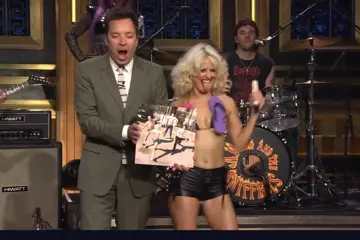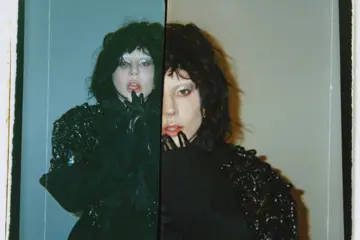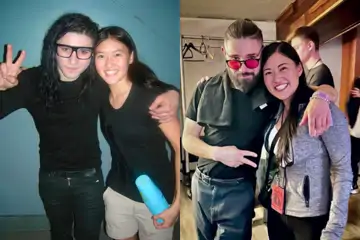“You think it's too much?” asks Leonardo DiCaprio, the titular rogue in Baz Luhrmann's big-screen, big-dollar adaptation of F. Scott's Fitzgerald's jazz-age novel, The Great Gatsby. He's asking this of Tobey Maguire, who as the narrator serves as the audience's 'in'; a simple fellow lured into a world of Roaring Twenties bacchanalia and pop-video excess, an honest man swallowed by a dishonest world. Given Leo's asking the viewer's proxy, it feels like - with somewhat of a wink - that he's asking you; pausing amidst the MTV Cribs tour of his palatial fantasia to just check that you're impressed.
Yet, the answer is: yes. It's too much. It's all too much. All the thousands of fidgety edits, the endless dissolves into dissolves, the way handwriting and typed words cavort about the screen. All the confetti and streamers, the digital fireworks (no, like, literally), post-hoc lens-flare, the cathedrals-worth of CGI'd candles. All the times the background recedes whilst the foreground pushes forward, to justify shooting a parlour drama from the prohibition era in 3D. All the endless clink of crystal and diamonds, captured with a shrill digital tone, and scattered about the soundtrack in the stylised clank of sound-designed 'wealth'. All the hysterical colour grading, which turns even the most familiar item of daily life into something so bright and sharp and pixel-edged it could take an eye out. All the tedious comparisons between '20s flappers and '90s rappers, with gangsters in the margins of both. Every single time Leo says 'Old Sport'. It's all too much. Way too much.

Whispering sweet 'Old Sports' in her ear.
This is the cinema of Luhrmann, perhaps cinema's most obnoxious maximalist; someone who imagines himself to be in the mode of Cecil B. DeMille, yet feels more like a less-explosiony, slightly-less-misogynist, not-as-much-of-a-military-shill-but-probably-just-as-awful Michael Bay. For better or worse - and, in case we need to actually say it: it's worse; so much worse - our Baz is the most widely-seen and celebrated Australian filmmaker in the world; someone who turns out tent pole popcorn pictures that, if you wanted to forward the argument, are auteurist works; selling every element of his high-fructose CGI eyesores with the desperation of a used-car salesman.
But the results speak for themselves: five films in, and, for all the cash he's pocketed, Luhrmann has also made one good film (1996's William Shakespeare's Romeo & Juliet) and, now, four awful ones. His take on Shakespeare seemed like an audacious piece of hyperventilating postmodernism, but this now-familiar trick of de-historification - anachronistic pop-songs and unreal digital worlds et al - falls horrifyingly flat with The Great Gatsby, which takes a cautionary tale on Empire-in-decline excess and turns it into one big hyper-capitalist party. The Craig Armstrong orchestral score never swells so much as when the narration says 'Old Money', as if the sight of not-actual-horses cavorting on the pitch of FIFA '95 should make our heart feel giddy; all the endless man-servants and flushing-money-down-the-toilet set-pieces a case of Luhrmann adapting a classic of American literature as if it's Sex And The City 3.

Surely we're not the proto-Jersey Shore caricatures you speak of?

Someone looks like they're not enjoying the flying curtains party...
If the audience is invited to identify with Maguire's everyman stooge, then the filmmaker surely sees himself in the eponymous anti-hero. “Is all this made entirely from your imagination?” Carey Mulligan giggles, at the ersatz opulence that she wanders through, marvelling at how this self-made shyster has conjured a “perfectly irresistible” lifestyle of richness and famousness out of nothing; Luhrmann clearly delighting in this delight, as if it's a compliment on the magic of his own powers-of-make-believe, at how he (and an endless team of mouse-jockeys working at an endless bank of computers) can take his dreams and put them up there on screen.
It just so happens, though, that Luhrmann dreams in cliché: his fantastic vision for Gatsby's palace as tacky as a third-rate Las Vegas hotel; the story told with a hokey framing-narrative device in which Maguire tells a spelling-out-the-obvious Jack Thompson the 'tale' of Gatsby; every joke oversold with a panto buffoonery; a dalliance in the lower-classes so much slumming with sneering, proto-Jersey Shore caricatures; a French butler coming with Clouseau-esque Frog accent; big-band song-and-dance numbers feeling less Busby Berkeley, more Lou Vega video. All this 'pomp and circumstance' is pumped out with a desperate breathlessness, a barrage of constant crescendos and routine, over determined detonations that make its swaggering cockiness scan as so much empty bluster. The Great Gatsby plays like a show that's terrified you'll change the channel; less a confident cinema event and more feeble fodder meekly catering to those scanning through it on digital devices.

Oh Daisy, it's hard for us to give a shit about you.
Given it's pitched at people on treadmills, plane flights, or commutes, The Great Gatsby doesn't really need a narrative to work; it could've functioned just as easily - and, perhaps, more enjoyably - as a 90-minute music video. Instead, it's a 140-minute 'tragic love story' of sorts. But, like Maguire's narrator, we're just on the sidelines, stuck at a party with no party to cheer for. Gatsby's a fucking creep, a stalker who moves in across the bay from the girl-he's-obsessed-with, keeps a scrapbook filled with pictures and newspaper clippings of her, and generally scans as a future abusive boyfriend; a control freak in love with the idea of a person less than the person themselves. Perhaps that's the natural culmination of falling for someone as essentially empty as the waify Daisy, who flutters between paper-thin and cipher as she speaks every one of her emotions aloud (“It makes me sad!”) whilst being played by Mulligan as Women On The Verge Of Fainting. They're star-crossed-lovers, destined to be divided by cruel destinies - she married to the brutish Joel Edgerton - but it's hard to muster a shit for either.
Given how little he cares about historical accuracy and/or fidelity to source-text, Luhrmann could've made his adaptation less a story about Men Fighting Over A Woman; could've tapped into the idea of Flappers as frontline feminists, Independent Women Pt. 2 with heart and fate in their own command. But he never does, and The Great Gatsby never finds an emotional foothold, nor a philosophical frisson to add a thematic edge to its brainless excess. It has no raison d'être beyond the benjamins; depicting wealth in hopes of accruing it. Its essential falsity - emotionally, cinematically, stylistically - is symbolised in one tiny, perfect moment in which Maguire looks at an old snapshot of Gatsby in wartime that he dubs “undoubtedly authentic”. Yet, every time The Great Gatsby repurposes archival footage into its 3D digitalia, there's a jarring clash that feels like a hokey stock-footage splice, and so goes this photo: DiCaprio's head Photoshopped onto the body of an old soldier so unconvincingly it almost like a gag. So goes the photo, and so goes Luhrmann's picture-play: The Great Gatsby fusing modern-day cinematic gimmickry with century-old wardrobe in a filmic flim-flam that's undoubtedly inauthentic.















